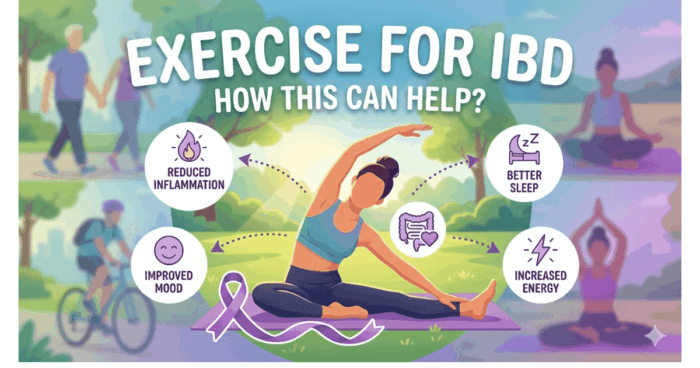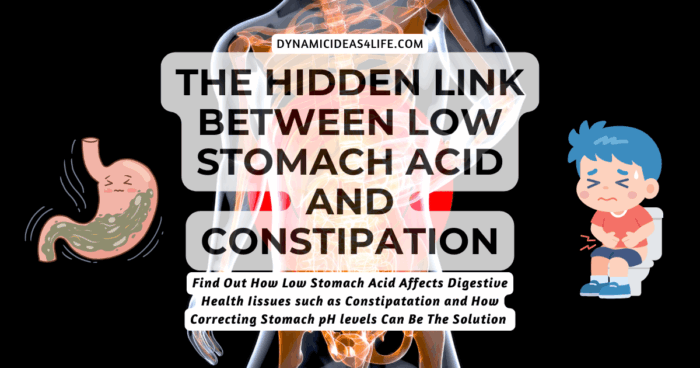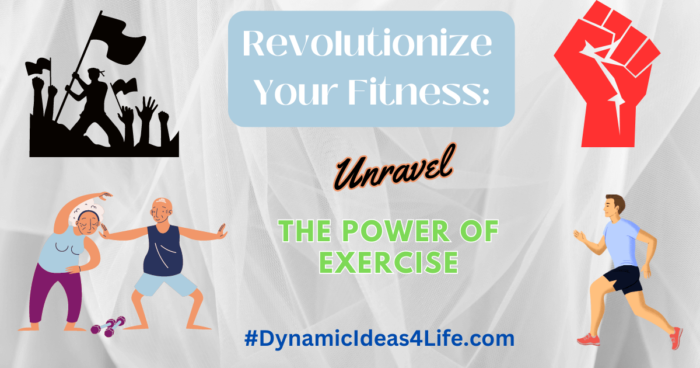Are you wondering about How To Revolutionize Your Fitness? If you are looking to unravel the power of exercise then look no further. In today’s post, this will be something we look to explore.
In the current world where sedentary lifestyles dominate, engaging in regular exercise and maintaining fitness has never been more pertinent. The implications of consistent physical activity extend far beyond superficial aesthetics; they offer a multitude of health benefits, helping us elevate our body functions and promote overall wellness.
Through this discourse, we shall delve into the myriad aspects of exercise and fitness, appreciating their importance in our daily lives, understanding diverse types of exercises and their unique merits, and exploring proven strategies that can enhance fitness levels and facilitate a healthier lifestyle.
Revolutionize Your Fitness! – The Power of Exercise
The Influence of Exercise on Wellness
The operation of the human body is highly reliant on regular exercise and fitness routines. The sheer importance of maintaining an active lifestyle cannot be emphasized enough. When one embarks on regular exercise, it’s like giving the body the fuel it requires to run efficiently.
Body Functions and Regular Exercise
The body is designed to move, so when it is stationary for prolonged periods, it affects various physical functions negatively. On the other hand, regular exercise stimulates these functions, ensuring they operate optimally and cohesively for overall wellness.
For starters, let’s look at the muscular system. Regular exercise leads to the toning and strengthening of muscles, bolstering an individual’s physical strength. Whether it is lifting weights or doing body-weight exercises, these activities not only develop muscle mass but also improve muscle endurance.
In relation to the cardiovascular system, regular exercise optimizes heart function as the heart is a muscle that needs regular exertion to remain robust. During exercise, the demand for oxygenated blood increases, causing the heart to pump harder. This strengthens the heart muscle, making it more effective in distributing blood throughout the body, even while at rest.
Furthermore, the respiratory system benefits as well. Regular exercise increases lung capacity, as the increased demand for oxygen during physical exertion prompts the lungs to utilize more alveoli for oxygen exchange. This enhances respiratory efficiency, leading to better oxygen absorption and distribution in the body.
Exercise and Disease Prevention
Regular exercise and good personal fitness can significantly reduce the risk of developing various chronic diseases. These include diabetes, obesity, and coronary heart disease.
Regular physical activity improves insulin sensitivity and regulates blood glucose levels, thereby reducing the risk of type 2 diabetes. Furthermore, it aids in maintaining a healthy body weight by balancing caloric intake and energy expenditure.
One of the most significant risks to the cardiovascular system is the build-up of fatty deposits in the arteries – a condition known as atherosclerosis. Exercise helps by reducing this build-up, thereby preventing conditions such as heart disease and stroke. It also aids in maintaining healthy blood pressure levels.
Exercise and Mental Wellbeing
Beyond physical fitness and disease prevention, regular exercise is instrumental in promoting mental health and well-being. It has been shown to reduce stress, anxiety, and depression, and enhance mood.
This is due to the release of endorphins during physical activity, a hormone known for creating feelings of happiness and euphoria.
Moreover, regular physical activity can boost cognitive function. It increases blood flow to the brain, promoting the growth of new brain cells, and enhancing memory, attention, and processing speed.
In Summary
Maintaining regular exercise and attaining good personal fitness are indispensable health pursuits rather than mere hobbies. They represent comprehensive solutions for physical health, disease prevention, and mental well-being, serving as potent remedies for many modern life maladies.
Therefore, it’s time to don the trainers, embrace the fitness center or embark on a run, making exercise a vital part of your lifestyle.

Types and Elements of Exercise
The Importance of Aerobic Exercise
One significant method to establish a healthy and active lifestyle is through aerobic exercise, widely known as endurance or cardio training. This specific type of physical activity has the effect of escalating cardiovascular health, enhancing respiratory function, and bolstering overall stamina by increasing your heart and breathing rates.
Popular variations of aerobic exercises such as jogging, cycling, swimming, and walking are not only fun but can be smoothly integrated into daily routines or done collectively in groups for socializing.
Strength Training
Strength exercises, otherwise described as resistance training, focus on the major muscle groups and aim to enhance their power, endurance, and size. Compound exercises, that is, movements that recruit multiple muscle groups like squats, deadlifts, and bench presses, are a fundamental part of strength training.
Over time, strength training can help improve body composition, promote bone health, and aid with weight control.
Flexibility Exercises
Flexibility training is another crucial type of exercise that assists in improving the range of motion in our joints and muscles. This type of exercise includes stretching activities like yoga and tai chi. Regular flexibility training can help with posture, and performance during exercise. And it can also help reduce the risk of injury.
Balance Training
Balance exercises focus on maintaining stability while performing activities, aiding in the prevention of falls; a key concern as we age. Examples of such exercises include heel-to-toe walks, standing on one leg, and tai chi movements.
Understanding the Principles of Exercise: Frequency, Intensity, Time, and Type (FITT)
When exploring the world of exercise and fitness, becoming acquainted with the FITT principle is fundamental. This principle elucidates how one can develop a safe and efficacious training routine.
The term Frequency represents the number of times you undertake your exercise activities. Consistency is key, with the frequency of exercise depending on your personal goals and the specific type of exercise.
Intensity signifies how strenuously you’re working during the exercise. This measure varies depending on the type of exercise, with the talk test or monitoring heart rate being common methods of tracking intensity during aerobic activities.
Time, or duration, indicates the length of your exercise sessions. Depending on the form and intensity of the exercise, these sessions could last anywhere from several minutes to over an hour.
Finally, the Type of exercise pertains to the specific kind of activity undertaken. As stated before, aerobic, strength training, flexibility, and balance exercises each offer unique benefits and it’s advised to incorporate a mix of these exercises into your fitness routine.
These factors are flexible and can be modified to suit an individual’s fitness level, objectives, and preferences. Collectively, they offer a comprehensive framework for planning and adjusting physical activity routines.
A varied, balanced fitness routine typically includes a mixture of these exercise forms, frequency, and intensity levels in order to keep exercise sessions diverse and engaging.

Implications and Strategies for Fitness
Committing to a Fitness Lifestyle
Society often misconceives fitness as equaling physical strength or attractiveness. However, fitness extends far beyond looks: it fundamentally involves maintaining good health, having the capacity to perform physical tasks efficiently, and possessing resilience against diseases.
More importantly, being fit is a key factor for achieving optimum physical performance and is instrumental in preventing chronic diseases such as heart disease, diabetes, and obesity.
Implications of Fitness on Performance
The level of an individual’s fitness directly correlates to their physical performance. The fitter one is, the greater their endurance, agility, strength, flexibility, and balance will be.
These components of fitness are critical across multiple areas, from day-to-day activities to professional sports.
Moreover, being physically fit also boosts mental acuity. Regular exercise enhances cognitive function, increases mental sharpness, and improves mood by releasing endorphins – the ‘feel-good’ hormones. Therefore, fitness contributes not only to physical prowess but also to psychological wellness.
Fitness and Chronic Disease Prevention
The importance of fitness in disease prevention cannot be overstated. Regular physical activity strengthens the heart and reduces the risk of heart disease. It also improves insulin sensitivity, thereby helping prevent type 2 diabetes.
Exercise aids in maintaining a healthy weight, which in turn reduces the risk of developing obesity-related conditions such as hypertension and various forms of cancer. It’s also been shown that exercise can improve bone health and lower the risk of osteoporosis.
Strategies to Enhance Fitness Levels
Embracing a fit lifestyle requires a multi-faceted approach comprising a mix of regular exercise, a balanced diet, and healthy lifestyle habits. Start by aiming for at least 150 minutes of moderate-intensity exercise or 75 minutes of high-intensity exercise per week.
This can include activities like brisk walking, running, swimming, cycling, or strength training. Mixing up your workout routines can also add variety and keep your fitness journey exciting.
Holistic Approach: Diet and Lifestyle Modifications
Diet is another critical aspect of fitness. Consuming a balanced diet rich in lean protein, fruits, vegetables, whole grains, and healthy fats can fuel your workouts and aid in recovery. Aiming to drink at least 2 liters of water per day can also help in maintaining hydration levels, especially during exercise.
In addition, incorporating healthy lifestyle modifications such as tobacco and alcohol cessation, managing stress through mindfulness techniques, and ensuring sufficient sleep can further enhance your fitness levels over time.
Navigating Your Fitness Journey
Embarking on your fitness journey can seem overwhelming at first. However, remember that every change, no matter how small, can make a substantial difference. From committing to daily physical activity to mindful eating to regular health check-ups – every step you take towards fitness aids in enhancing your physical performance and significantly lowers your risk of chronic diseases.
Fitness is not just a phase, but a lifestyle change that can lead to remarkable transformations in physical, mental, and overall well-being.

Photo by whatyouhide on Unsplash
In Conclusion
Through understanding the immense benefits of regular exercise and sustained fitness, we can appreciate their necessity in our daily lives. When armed with the knowledge of different types of exercises and their unique advantages, making decisions that gear toward healthier living becomes less of a worry and more of a foregone conclusion.
Crafting a tailor-fit exercise routine encompassing elements like frequency, intensity, time, and type can help enhance physical performance and reduce the risk of chronic diseases.
By integrating strategies such as adopting healthy dietary habits and maximizing the benefits from workouts, you can navigate through your fitness journey with confidence and resilience.
Pretty much it is really this simple and by following these steps you can definitely start living a more healthy lifestyle that can begin much sooner than you ever thought possible.
Just making the decision to get started is all you need to do so keep this in mind after you walk away today!
Related Posts






Anxiety and Depression are you magnesium deficient best ways to lower blood sugar BiOptimizers blood pressure supplements blood sugar support supplements Digestive Enzymes Supplement digital products Dr Sam Robbins Exercise Gut Health Healthy Living heart health HFL how to lower blood sugar levels How To Lower Cholesterol insulin resistance joint health supplement Keto keto dieting Keto Diet Weight Loss leaky gut supplements leptin resistance list Magnesium deficiency Matt Gallant mental health multivitamins Nootropics nutrient supplements Probiotics Probiotic Supplements proteolytic enzymes reverse type 2 diabetes stress and anxiety stress relief success chemistry vitabalance vitapost Wade Lightheart weight loss articles weight loss diet plans weight loss product reviews weight loss supplements weight loss tea







